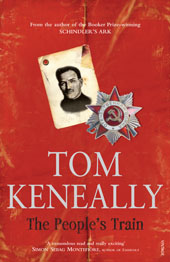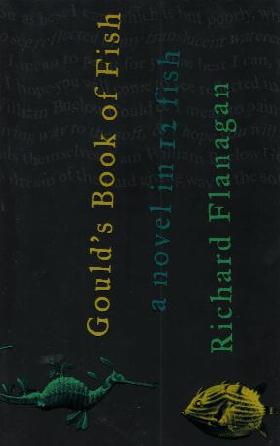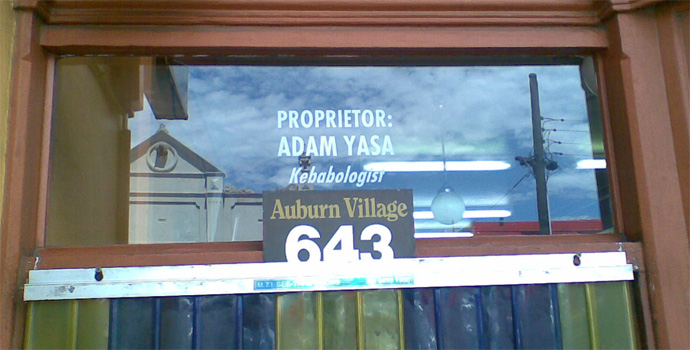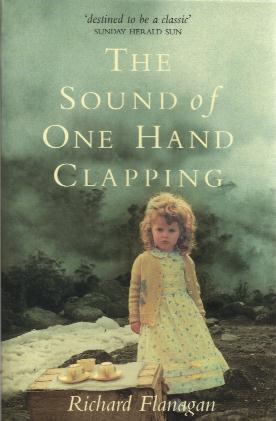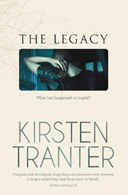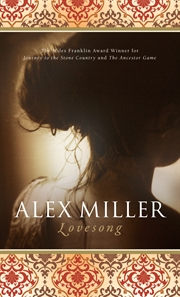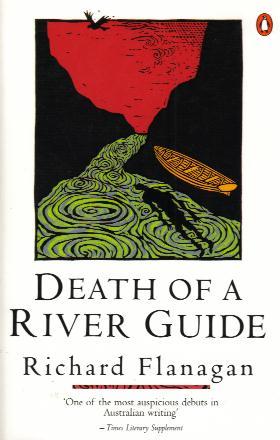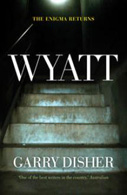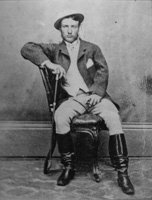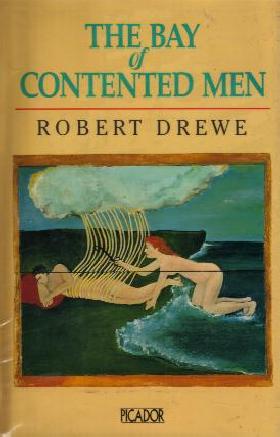In Melbourne, on July 19, died, in her 83rd year, a remarkable Australian-Englishwoman - Mrs. George Cross - more widely known by the maiden name which she used in her literary writings - Ada Cambridge. Her husband, for many years an Anglican clergyman in Victoria, died fourteen years ago. Of her numerous family of children, a married daughter and a son survive, residing in Melbourne. One baby died in infancy, another in boyhood, another (she wrote) "in the prime of his young man-hood - which for me had altered the whole face of the world and of the future."
Ada Cambridge was born in the English fen country, at St. Germains, in Norfolk, in 1844. Her father had a small middle-class estate; her mother was a country doctor's daughter. She was educated by governesses at home, and gave early tokens of literary talent. Her family life was strictly religious; her first poetical essays, "Hymns of the Litany" and "Hymns on the Holy Communion," were devoted to religious themes. At the age of 25 she married G. F. Cross, an ordained clergyman of the Church of England, who was coming to labour in Australia - then considered "a country of blacks and bushrangers." With him she reached Melbourne in August, 1870, and during many years performed all the duties of a bush clergyman's wife in different country districts of Victoria.
USEFUL TRAINING
Although her family was comparatively well to-do, Ada Cambridge had been trained to make all her own clothes as a girl; she made her own wedding gown. In her book entitled "Thirty Years in Australia," published 23 years ago - and still one of the best books of Australian reminiscence - she related how "housework has all along been the business of life; novels have been squeezed into the odd limes." "I made all my children's clothes, until the boys grew beyond their sailor suits, and the girl put her hair up."
A wonderful woman, indeed. Husband and family; births and deaths; a list of twenty published books - written, as she said, "most of them, to buy nice things for my babies; because there were always babies and never enough nice things for them"; and withal, an invalid for long, yet making her own dresses, curtains, and floor-coverings, and at first with her husband's assistance - her own furniture: breaking up her home seven times - until her husband was appointed canon in charge of Holy Trinity Church at Williamstown, Melbourne (1893 to 1912).
The Rev. George Cross also was no weakling. His wife records how, during part of his clerical country life, he seemed to live in the saddle, leaving it only to eat and sleep. "The following is the programme for a monthly Sunday in Wilcannia, where the breaking-in began. Up at 4 a.m. Breakfast at a station 25 miles distant. To morning service five miles (in an open shed, the congregation sitting on wheat stacks or what not). Dinner near by, and ride of twelve miles for afternoon service. Ride of seventeen miles home." (Total, 59 miles). "He was always fresh at the end of this tremendous day, or, at any rate, not more than pleasantly tired. The horse, too, which had carried him all day, though glad to reach its journey's end, was undistressed. It was by no means an exceptional day's work for an Australian horse."
"Only once," Mrs. Cross relates, "do I remember seeing George thoroughly knocked np." On this occasion he drove to a bush funeral 25 miles, rode 25 miles further, and 25 miles back, and then 17 miles home. "With temperature over 100deg., and the wind in the north, George was really tired out for once."
LITERARY LIFE
In 1875, Mrs. Cross commenced writing for "The Australasian" and other papers a series of novels of Australian life; most of which were subsequently published in book form in London. During many years, her prolific pen wrote a book a year. By 1890, both here and in England she was regarded as a popular novelist. The Australian element gave her books a pleasant novelty for English palates; yet, since she wrote as an Englishwoman, her work did not seem to English readers uncouth or foreign - as books more typically Australian seem often. For the serial rights of "A Marked Man" "The Australasian" paid Mrs. Cross £197. Other successful books were "The Three Miss Kings" and'"A Little Minx." These, with many more, that won temporary credit, have now gone down the hill of oblivion. Some of them can still be read with pleasure, but they have been supplanted by the never-ending new growth of popular fiction.
In 1908 Mr. Cross received news of an English legacy; and the wife who had left England with him in 1870, "a five-weeks bride," returned with him to her birthplace, "an old woman." This English journey, both sad and delightful, is chronicled in "The Retrospect" (1912). All Ada Cambridge's relatives, and most of her friends, had passed away; husband and wife soon returned to their home in Australia.
Four years later George Cross died, and in 1912 his widow travelled once more to Eng- land, intending to reside there. After some years she returned to her son and daughter in Melbourne. For a long time her writings had been widely spread; she had contributed much to English and American magazines. Gradually her circle of activity narrowed; and the woman who died in Melbourne last week had grown weary and frail: death came as a release from the trouble of long life.
The great crisis of that life came in 1887, when Ada Cambridge was 43 years old. During many years she felt that her passionate spirit had been thwarted and repressed. Though educated as a strict churchwoman, her questing striving mind was caught by the wave of 19th century doubt of theology, and she became in effect a Rationalist before Rationalism. Only the broadest church could have held her - and she had married a strict churchman. She closed her mouth; and, in the cant phrase, did her duty. But her mind could not be closed. For half her life she was at war with her environment.
She turned herself into a valiant clergyman's wife. She bore children; attended church, organised charity, presided over sewing meetings - she did her duty. She strangled her dreams, silenced her mind, and conformed. But her doubt and discontent persisted, with an anguish increased by the arduous and overdriven life she was often called upon to lead. From time to time she had written poems of personal unhappiness, intellectual septicism - some of them representing moods of married life; others, new beliefs gained in the process of thought and experience.
UNSPOKEN THOUGHTS
In 1886, at a period of physical instability and storm, Ada Cambridge gathered these poems together, and sent them to London for publication. Her small book of "Unspoken Thoughts" appeared next year. Perhaps 600 copies were printed; perhaps 50 copies came to the authoress in Australia. Her name did not appear on the title-page, and in the writing an effort had been made to suggest that the author was a man.
A few copies were circulated in Australia. Brunton Stephens in Brisbane received one, and its influence is seen in some of his own verses, and in those of two other Queensland writers to whom he lent the book. Henry Parkes in Sydney received one; and wrote in it:
"Strong book and true,
One of the few
That speak in tones
Which Nature owns --
That speak in sooth
The bitter truth."
But the shock to the Rev. George Cross was overwhelming. He learned that his wife had questioned Divine wisdom and doubted Eternal Hope. He read "A Wife's Protest" against the physical side of marriage: he read "An Answer" to pleading - "Thy love I am. Thy wife I cannot be." These poetical attitudes may have represented long-past feelings: but, to an Anglican clergyman in Victoria in the 'eighties, the fact that his faithful spouse, his valiant partner, could dream such thoughts, and write them, and publish them - even anonymously, and however included with other poetical works - was horrifying.
In the upshot. Ada Cambridge wrote to her publishers in London to destroy the edition of the book; and this was done. She herself, greatly troubled, came to Sydney for a time, and at Como, on July 28, 1887, wrote her beautiful sonnet, "Peace":
PEACE
The red rose flush fades slowly in the west;
The golden water, basking in the light,
Pales to clear amber and to silver-white;
The velvet shadow of a flame-crowned crest
Lies dark and darker on its shining breast --
Till lonely mere and isle and mountain-height
Grow dim as dreams in tender mist of night,
And all is tranquil as a babe at rest.
So still! So calm! Will our llfe's eve come thus!
No sound of strife, of labour, or of pain --
No ring of woodman's axe - no dip of oar.
Will work be done, and night's rest earned, for us?
And shall we wake to see sunrise again?
Or shall we sleep - to see and know no more?
Ada Cambridge returned to Melbourne and her home; atonement was made; by-and-by she recovered health and spirits: life grew easier, in spite of griefs; she was able to write later that "a woman is really only free, and able to enjoy herself, at sixty." Long before she died her "Unspoken Thoughts" were buried and forgotten. Yet, thirty years later, she cherished an intellectual regret that "I was never able to let myself go."
First published in The Sydney Morning Herald, 31 July 1926
[Thanks to the National Library of Australia's newspaper digitisation project for this piece.]
Note: Although this essay implies that Cambridge's poetry collection, Unspoken Thoughts, is lost, you can read an e-book version [PDF format] of the book from SETIS - The University of Sydney's literature digitisation project.
